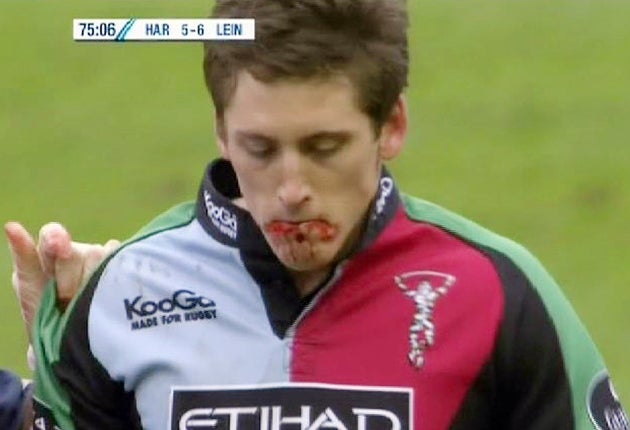Blood, sweat, tears and a sick feeling
Yes, every rugby match involves some form of 'cheating' but it is wrong to say the game is rotten to the core

Here is the News at Ten, from Planet Dystopia. Bong! Rugby has been revealed as no different to the rest of the world, and the truth is that the world is infested with lying, cheating, finagling scumbags who will stop at nothing to feather their own nests, hang on to their jobs and bend every rule in the book to their self-serving advantage and advancement. Bong! Are you happy now? No, me neither.
It has been a tough summer. A sport dear to millions of people's hearts has been sullied by Harlequins' bloody disgrace, the drug-taking at Bath and the face-clawing fingers of Schalk Burger. In offices and pubs, a mocking revenge has been wrought by those who always perceived rugby as a game for snobs, thugs, double standards when it comes to violence or simply something forced on them at school by a sadistic PE teacher.
Those of us who know and value rugby for what it is – a rough, challenging and complex game demanding a certain level of understanding and complicity among its participants – were shocked by Dean Richards' BBC radio interview last Thursday evening. In his flat East Midlands tones he explained how he and some of his Harlequins colleagues attempted to cheat Leinster out of the Heineken Cup, and lie to the subsequent disciplinary hearing so that everyone might "get off".
I got the same sick feeling in my stomach 21 years ago, in a press conference room in Seoul, South Korea, when the International Olympic Committee's Michele Verdier intoned the words "stanozolol ...it's an anabolic steroid". A couple of days beforehand I had witnessed Ben Johnson's world-record 100 metres run in the Olympic final; the greatest sporting moment I had seen in the flesh, or so I thought. The revelation of Johnson's doping opened my eyes and wounded the soul.
The statistical evidence is that cases of unacceptable cheating in rugby – whether it is doping or faking an injury or gouging an opponent's eye – are so infinitesimally few that just because they are brought to light it is disproportionate and wrong to conclude the game is rotten to the core. No one should keep little Johnny away from mini rugby on a Sunday because Harlequins' Tom Williams chewed on a capsule of beetroot puree or whatever it was. For every Burger, Alan Quinlan, Neil Best, Marius Tincu or Sergio Parisse banned last season for gouging or its near equivalent – scraping the hand across an opponent's face – there are hundreds of thrilling, hard, enjoyable professional matches without such incidents.
Yet here is the tricky bit. Every rugby match that is played contains some form of cheating. The game is predicated on getting away with what you can, and it only works with the acceptance that "we're all in this together". This pisses off a lot of rugby's critics and undoubtedly informs the sometimes lenient bans handed down for what other walks of life would consider awful crimes, although enough lawyers hang around the disciplinary proceedings to suggest a decent testing of precedent and mitigation.
It is a delicate balancing act: to uphold the principles of a confrontational game while damning as deviants those who take it too far – though damned and banned they must be. Richards is an ex-policeman and England forward who likes a pint, a bet on the horses and a spot of shooting as a country pursuit. The five times he tried the fake blood ruse, he may have convinced himself that "the rule has a loophole, so why shouldn't I exploit it?" The lack of respect for his peers and opponents was utterly reprehensible, and a most twisted representation of rugby's morals and mores.
The only answer is to keep the chin up and keep looking at the lawbook. The Laws of the Game stretch to well over 100 pages and the International Rugby Board have tried and failed in recent years to slim the tome down. For every loophole they close, another one opens. We can expect a flurry of regulatory activity now – on uncontested scrums (a running sore addressed by the IRB at a tortoise's pace), on blood substitutions and the distinction between tactical and injury replacements, and on the sanctions applied to users of recreational drugs. The IRB's code of conduct obliges players to bring wrong-doing to the authorities' attention. Most players are probably unaware it exists. They need to learn.
The shame-faced Harlequins are writing a process of whistle-blowing into their employees' contracts. I asked Quins' chief executive Mark Evans if this was appropriate to a sport which relies on trust between team-mates. He shrugged the shrug of a man who – like Richards – has spent a lifetime playing, coaching and promoting what is still a great game but which, as a way of earning a living, is merely jockeying for space on Planet Dystopia.
Subscribe to Independent Premium to bookmark this article
Want to bookmark your favourite articles and stories to read or reference later? Start your Independent Premium subscription today.

Join our commenting forum
Join thought-provoking conversations, follow other Independent readers and see their replies